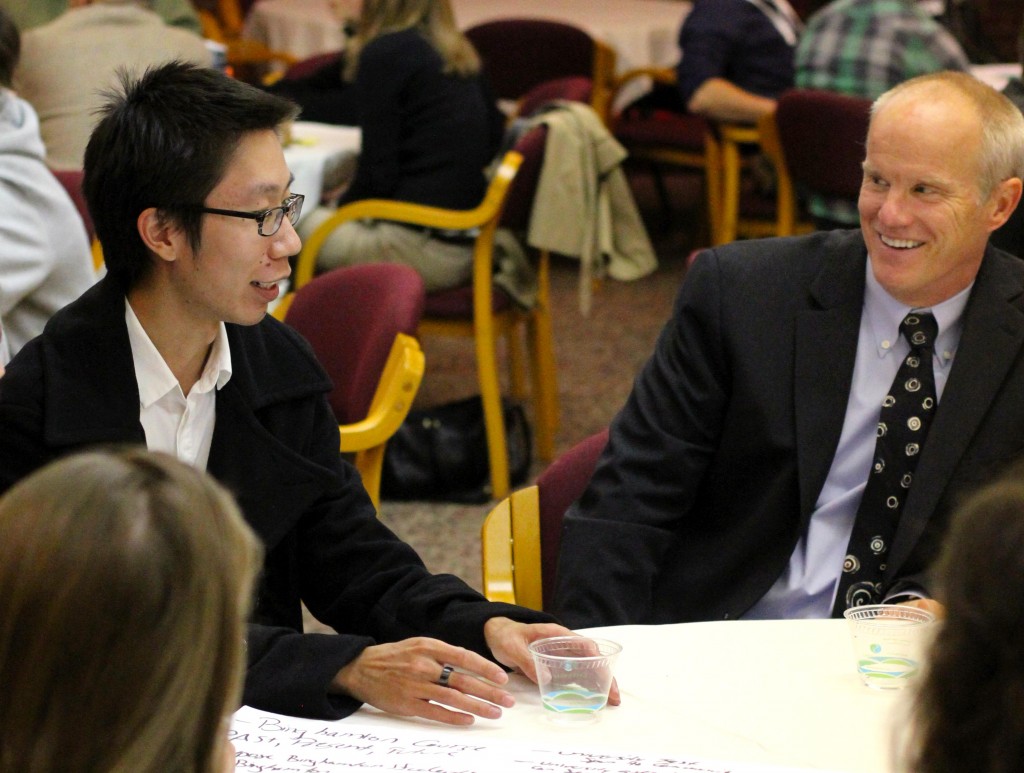
On Thursday evening, Binghamton University President Harvey Stenger held the second of three forums outlining his Road Map to Success, this time focusing on his Community Engagement team — one of nine teams that compose the Road Map.
According to Stenger’s Road Map manual, the Community Engagement team will define “community” and “engagement” more specifically while brainstorming ways to increase Binghamton University involvement in the community as the team defines it.
“The team will outline positioning and action steps the University could undertake to establish new relationships or build on existing operations, programs or connections in the community,” the manual says.
Stenger kicked off the forum, telling attendees the goal was to come up with ideas to help Binghamton University play a bigger role in the community.
“We’re looking for ideas, we’re looking for thoughts, we’re looking for answers to how we can do things better,” Stenger said. “Why don’t we, as a university, decide for ourselves what the premier public university should be in the 21st century? Let’s define that, and let’s find a way to get from here to there.”
Following the opening comments, attendees sat at tables in groups of five to discuss their ideas for increasing community engagement. Each table was supplied with a large pad of poster paper and a variety of colored markers to record their ideas.
Pam Mischen, director for the Center for Applied Community Research and Development, stressed the importance of community involvement.
“If we are going to become a premier public university, community engagement is one of the ways we’re going to get there,” Mischen said.
The topics of conversation ranged from students’ perceived lack of things to do in the city to the difficulty of getting from place to place without a car. Both students and administrators discussed their opinions on the issues.
“It’s so easy to live in a bubble,” said Carrie Burke, resident director of Seneca Hall in College-in-the-Woods. “You live on campus, have your room, go to the bookstore if you need to buy something, and go to the dining hall if you’re hungry. It’s easy to get caught up in that and not go out into the community.”
Many students pointed out that there are a lot of opportunities to get involved in the community but that students miss out because they are not aware of them.
Others cited transportation as a factor keeping them from doing everything they want.
“I think transportation is a challenge for students, especially in terms of getting outside of the immediate areas that the blue buses take students to,” said Alison Handy, a graduate student in the public administration department.
Henry Aery, a sophomore majoring in accounting, said engaging BU and the community is important in retaining quality faculty members.
“What really stood out to me was the need for faculty retention,” Aery wrote in an email. “The faculty are a key component to Binghamton’s academic success, so it is important to have a vibrant city to attract the best faculty members and to provide them a place to raise a family and work for the University long term.”
Aery said the mix of students, faculty and staff made the forum successful.
“The diversity among those in the discussion certainly provided unique perspectives,” Aery said. “Whether the speaker was a student, professor, ResLife representative, CCE worker or the President himself, ideas were brought to the table that challenged others to think critically about the impact, plausibility and effectiveness of that idea.”


